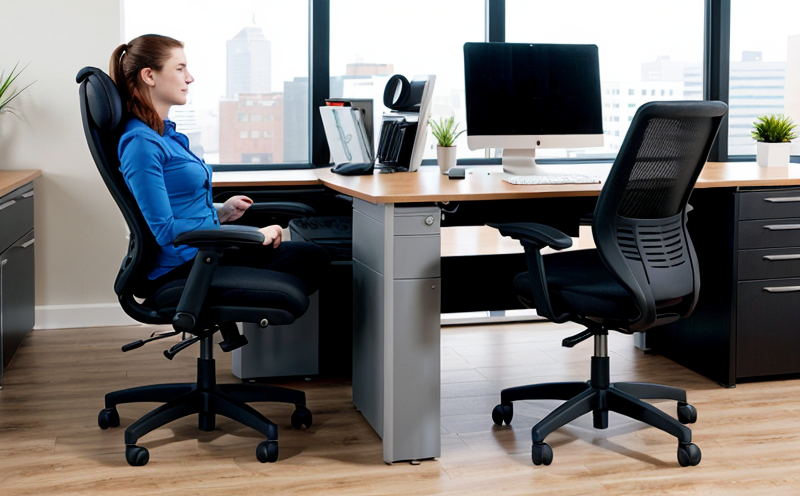UNE EN 1728 Mechanical Durability Testing of Office Seating Furniture
The UNE EN 1728 standard provides a framework for mechanical durability testing of office seating furniture. This test is pivotal in ensuring that the products meet the stringent requirements set by this international standard, which covers both static and dynamic loading conditions under which office chairs are subjected to simulated real-world use.
The primary goal of this test is to evaluate how well the chair withstands continuous or intermittent mechanical stress over a specified period. This ensures that the furniture remains functional and safe for extended periods without compromising on ergonomic design or structural integrity. The standard includes several critical parameters, including load capacity, seat tilt mechanism performance, backrest stability, armrest strength, and overall assembly robustness.
Manufacturers often use this test to validate their product designs before mass production begins. By adhering to UNE EN 1728, they can demonstrate compliance with international standards, which is crucial for market entry in Europe and other regions that accept these norms. Compliance also enhances customer trust as it signifies adherence to robust quality assurance protocols.
The testing process involves several steps, starting from the preparation of test specimens, such as ensuring the chair's load capacity matches the specified range, to the actual application of loads using specialized equipment designed for this purpose. The dynamic loading tests simulate typical office usage patterns, including sitting and standing positions, arm movements, and weight shifts.
The static loading tests aim at assessing the structural integrity under sustained pressure, which is critical in preventing accidents due to sudden failures. These tests help manufacturers identify any potential weaknesses in their product design or manufacturing processes that could lead to quality issues down the line. By addressing these issues early on, companies can improve product reliability and reduce post-sale support costs.
The results of UNE EN 1728 mechanical durability testing are detailed in a comprehensive report provided by accredited laboratories like ours. This document includes all relevant test data, including load capacities achieved, any observed defects or anomalies during the tests, and recommendations for improvements if necessary. Such reports serve as valuable tools not only for quality assurance but also for continuous improvement efforts within R&D departments.
In summary, UNE EN 1728 mechanical durability testing plays a crucial role in ensuring that office seating furniture meets high standards of functionality, safety, and durability. It provides manufacturers with objective evidence supporting their claims about product performance while helping them maintain competitive edge by meeting regulatory requirements efficiently.
Benefits
Compliance with UNE EN 1728 offers numerous benefits to furniture manufacturers:
- Enhanced Product Quality: Ensures that the office chairs meet stringent mechanical durability standards, enhancing overall product quality.
- Increased Customer Trust: Demonstrates commitment to producing reliable and safe products, thereby boosting customer confidence.
- Market Expansion: Facilitates easier access to European markets where this standard is widely accepted.
- Better Reputation: Establishes a positive reputation among consumers who value high-quality office furniture solutions.
- Potential Cost Savings: Identifies potential issues early in the design phase, leading to fewer warranty claims and customer dissatisfaction.
By incorporating UNE EN 1728 into their quality control processes, companies can ensure they are meeting international standards for mechanical durability testing. This not only enhances product performance but also contributes positively towards environmental sustainability by reducing waste associated with poor-quality products.
Quality and Reliability Assurance
- Standardized Testing Procedures: Ensures consistent evaluation methods across different manufacturers, promoting fairness in the industry.
- Data Accuracy: Provides precise measurement results using advanced testing equipment, ensuring reliable outcomes.
- Consistent Reporting: Standardizes reporting formats, making it easier for stakeholders to understand and act upon findings.
- Improved Product Lifecycle: Helps identify early signs of wear and tear, allowing manufacturers to implement preventive maintenance strategies effectively.
- Regulatory Compliance: Ensures adherence to international standards, facilitating smoother regulatory processes and reducing non-compliance risks.
Accurate, consistent quality assurance through UNE EN 1728 testing contributes significantly to maintaining high levels of product reliability. This is particularly important in an industry where even minor defects can lead to significant financial losses due to recalls or safety concerns.
International Acceptance and Recognition
The UNE EN 1728 standard enjoys widespread recognition across various countries, including those within the European Union. Its acceptance in these regions underscores its importance as a benchmark for mechanical durability testing of office seating furniture. Many regulatory bodies mandate adherence to this standard, making it essential for manufacturers seeking entry into specific markets.
Recognition extends beyond Europe; many global organizations also endorse UNE EN 1728, further emphasizing its significance in the broader international community. Compliance with these standards enhances a company’s reputation and opens doors to new business opportunities worldwide.
The standard's broad acceptance reflects its effectiveness as a tool for ensuring consistent product quality across diverse manufacturing environments. By aligning their practices with UNE EN 1728, companies demonstrate their commitment to excellence in design and production, which is increasingly valued by both customers and regulatory authorities alike.





